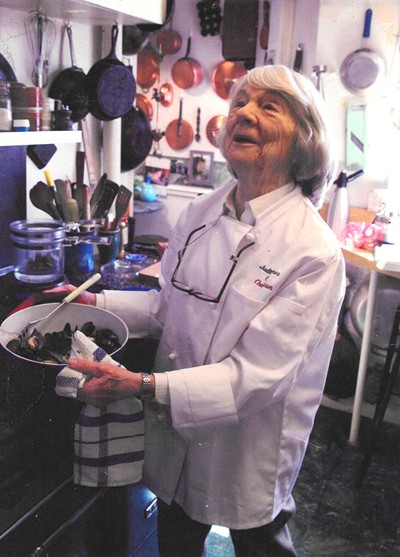
- Courtesy
- Judith Jones in 2011 in New York City
When I first interviewed Judith Jones in 1984 for a newspaper story about a book on New England cooking she and her husband, Evan, were working on, she let him do the talking. Fit and petite, Jones smiled encouragingly at him as she fried milkweed pods and squash blossoms stuffed with chorizo in their cozy cottage in the Northeast Kingdom.
Though she was 60, Jones seemed girlish and had a way of dropping her voice as though sharing a delicious secret. She was so self-effacing that I didn't realize at the time what an outsize influence she had on what America reads and eats. Like any good editor, Jones liked to stay in the background.
Working at the New York publisher Alfred A. Knopf when she was 36, she famously scooped up Julia Child's Mastering the Art of French Cooking, which another publisher had rejected. Jones believed the French approach to food was just what many Americans in the 1960s yearned for.
She edited literary giants such as Langston Hughes, John Updike and Anne Tyler, and she also published the signal cookbooks of the 1960s, '70s and '80s in every major cuisine, including those by Black, Asian and Indian authors, such as Edna Lewis, Irene Kuo and Madhur Jaffrey. At a time when the publishing world viewed cookbooks with thinly veiled disdain, Jones edited them like works of literature.
When I became a magazine editor and later a book editor, Jones was my role model, the gold standard. She gave me my first taste of the glamour of publishing, introducing me to Lauren Bacall in the Knopf office and showing me around Julia Child's Cambridge, Mass., kitchen while her PBS show was being filmed. Later, Jones became one of my authors, when I republished Knead It, Punch It, Bake It!, a book for kids that she wrote with Evan.
"My happiest memories are associated with food," Jones told me then. "I can still remember the plop of batter as it was stirred by a wooden spoon."
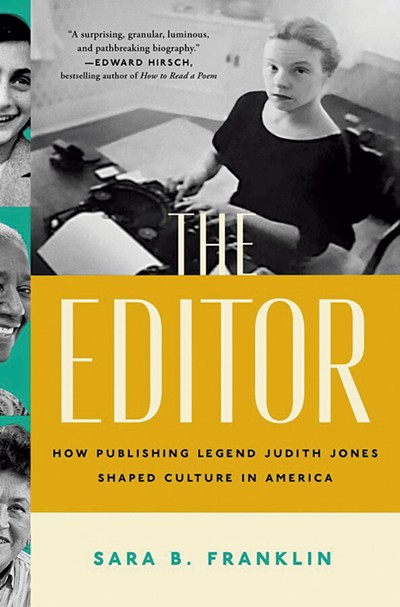
- Courtesy
- The Editor: How Publishing Legend Judith Jones Shaped Culture in America by Sara B. Franklin. Atria Books. 316 pages. $29.99
For the more than 30 years that I knew her, I often wondered how Jones discovered such a sterling cast of writers, from Pulitzer Prize winners to a global roster of culinary experts who expanded our palates and pantries. What's more, she made many of those books blockbusters.
How did this reserved woman, who was never happier than when she was swimming in the icy waters of the pond at her Walden cabin, develop that North Star judgment?
In The Editor: How Publishing Legend Judith Jones Shaped Culture in America, a riveting biography by Sara B. Franklin, I found answers and learned just how much I didn't know about my friend.
Franklin, who is the author of a previous book on the African American chef Edna Lewis, spent a decade overall getting to know Jones and then interviewing nearly everyone who knew her, including me. The biographer was granted access to Jones' personal papers stretching back to her childhood. The result is an intimate but clear-eyed portrait that clips along like a fast-paced novel.
Jones, the daughter of a lawyer from Montpelier and a class-conscious New York City mother, grew up on Manhattan's tony Upper East Side but from the start preferred Vermont, where the family summered.
"I used to stamp my feet and say, 'I'm a Vermonter, not a New Yorker,'" she told Franklin. Before attending an exclusive New York City private school, she convinced her parents to let her spend eighth grade in Montpelier. "I was going to Vermont to grow up," she confided to Franklin. Instead of a Seven Sisters college (the women's equivalent of an Ivy League at the time), she chose Bennington College, where the poet Theodore Roethke, her professor, became her lover.
For the rest of her life, Vermont was both her refuge and a tonic. After 50 years at Knopf, she retired to Walden to write books and raise grass-fed cattle until she died there in 2017 of complications from Alzheimer's.
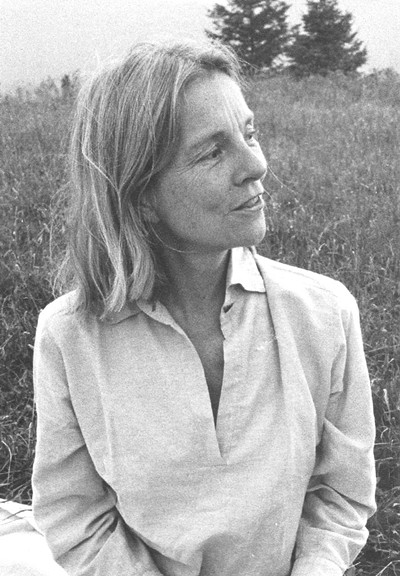
- Courtesy Of Bronwyn Dunne
- Judith Jones circa 1982 in Walden
Those seeking clues to how Jones became one of the great editors of the 20th century will find plenty of them in Franklin's book. At 17, while interning at Doubleday, she edited a best-selling author with no instructions, telling Franklin, "I decided to trust my own instinct."
The job bored her, though, so she decamped to Paris. Her adventures make for one of the book's most intriguing chapters. The 24-year-old drank in the Sartre-Camus literary scene; hung out with novelist Gore Vidal and his lover Tennessee Williams; and started a salon-supper club with two friends, cooking for guests to bankroll her love of food and wine.
In Paris, Jones fell in love with Evan and married him. And as a mere assistant in Doubleday's outpost in the city, she plucked a 13-year-old girl's diary out of a slush pile of rejects and told her incredulous boss he had to publish it in English. (He later took full credit for Anne Frank: The Diary of a Young Girl.)
Franklin shows that Jones was not infallible. After publishing Sylvia Plath's poetry at Knopf, she firmly declined her novel, The Bell Jar, saying it wasn't believable.
Throughout the book, Franklin skillfully situates Jones' personal and professional life in the context of women's history. And she notes, despite all the mega bestsellers, Jones remained woefully underpaid compared to her male colleagues.
Though no book can provide a road map to genius, The Editor gave me something better: an indelible picture of the grit, guile and passion for finding the right words of the woman who inspired my career.
Rux Martin is a Ferrisburgh-based freelance editor and writer. She retired from Houghton Mifflin Harcourt in 2019 after almost two decades of editing cookbooks by Jacques Pépin, Dorie Greenspan, Pati Jinich, Mollie Katzen and Marcus Samuelsson.
From The Editor: How Publishing Legend Judith Jones Shaped Culture in America
After the war, American women had been pushed from the public realm when they were ousted en masse from paid jobs. Now, with their culinary skills recast as old-fashioned and obsolete, they were being edged out of the private space of their kitchens, too. It was almost as though women themselves were falling into disuse. Judith wanted to resist, and she understood that Julia Child did, too. While living in Paris, both women had come to see the kitchen as a place of purpose and sensual pleasure, and one of power as well. In their view, cooking wasn't drudgery (though it certainly was work), and it wasn't a gendered trap to be escaped. Rather, they saw the culinary arts as a gateway to the wider world and a richer, more autonomous life. Through food, Judith and Julia had found something of a shared politics, a way to express a femininity unfettered by what they saw as conservative American norms. "Food was our rebellion," Judith told me. "It gave us the courage to see things, make things happen." The time was ripe, Judith thought, to get their message through.
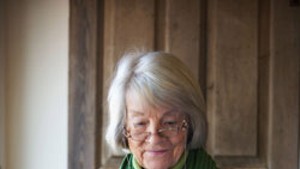
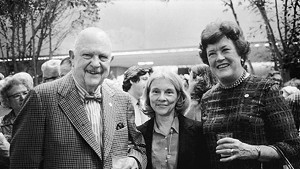
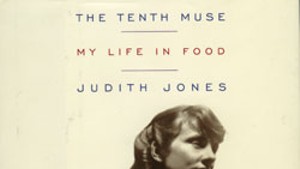



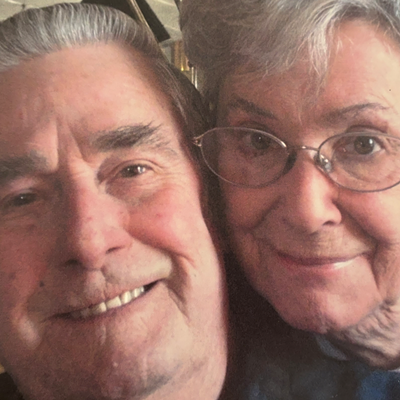
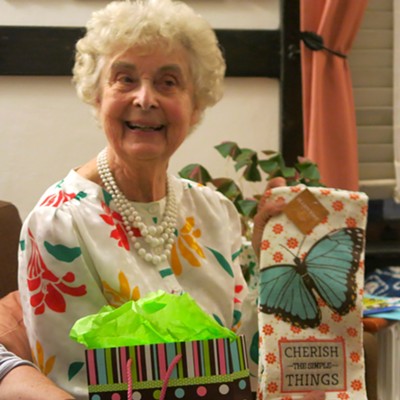


Comments
Comments are closed.
From 2014-2020, Seven Days allowed readers to comment on all stories posted on our website. While we've appreciated the suggestions and insights, right now Seven Days is prioritizing our core mission — producing high-quality, responsible local journalism — over moderating online debates between readers.
To criticize, correct or praise our reporting, please send us a letter to the editor or send us a tip. We’ll check it out and report the results.
Online comments may return when we have better tech tools for managing them. Thanks for reading.